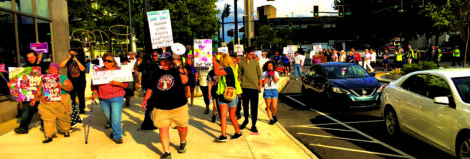Kwanzaa celebration encourages unity
YOUNGSTOWN — As difficult as this year’s major upheavals and challenges continue to be for millions, they also should be used to underscore the importance of people unifying with one another, a longtime religious leader contends.
“The George Floyd death awakened us and taught us we need to be united in our fight” against systemic racism and for freedom and greater equality, the Rev. Kenneth L. Simon, pastor of New Bethel Baptist Church, said.
Simon delivered his remarks during a mostly virtual Kwanzaa kickoff celebration Saturday evening at the church, 1507 Hillman St., on the South Side. Because of the ongoing health pandemic, the one-hour event also was livestreamed on Facebook.
Hosting the celebration was Harambee of Youngstown Inc., and the focus was on umoja (unity), the first of Kwanzaa’s seven principles. The seven-day holiday’s other six principles, one each of which is celebrated per day, in order, are kujichagulia (self-determination), ujima (collective work and responsibility), ujamaa (cooperative economics), nia (purpose), kuumba (creativity) and imani (faith).
Kwanzaa, observed Dec. 26 to Jan. 1, is an annual African-American celebration of life that Dr. Maulana Karenga introduced to the U.S. in 1966 to welcome the first harvests to the home. In addition, Kwanzaa has five core values central to the week’s activities: reverence, commemoration, celebration, recommitment and in-gathering.
Simon said he hopes more people will derive spiritual lessons from and become more unified via three of this year’s high-profile events: the killing in May of Floyd, an unarmed black man, by a white Minneapolis police officer, as well as the 10-month pandemic and the Nov. 3 general election.
This year “has been filled with some unexpected, unpleasant events we should learn from and do better,” said Simon, who noted the U.S. has about 18 million COVID-19 cases and is closing in on 400,000 deaths from the virus.
After Floyd’s death, more people felt it was OK to openly discuss the Black Lives Matter movement and racism, the pastor said.
The last four years have seen an uptick in the number of hate crimes, along with a greater amount of overt disrespect for others and further attempts to suppress mainly black voters. Consequently, more black people must come together to make their voices heard, he continued.
“We as a people need to unite in our fundamental right to vote and to use our vote to advance the cause of our people,” Simon said, adding, “I hope events this year have taught us some lessons we will embrace and take into the new year.”
Kenneth King, a longtime activist, discussed several key symbols of Kwanzaa, including the unity cup used to pour libations to ancestors; ears of corn that represent children and the hope espoused in their generation; gifts that signify parents’ commitments to their children; and various fruits and vegetables that represent the harvest celebration. Also, the seven colored candles remind people of the seven principles, King explained.
Usually, one candle per day is lit during Kwanzaa, but because of the pandemic, all seven were lit at Saturday’s event, which also featured a variety of songs and dances from Harambee members.
Because of the health crisis, a small number of veteran and young dancers were selected to perform in person, said Zakiya Miller, Harambee of Youngstown’s administrative assistant. She also noted social distancing and mask-wearing were enforced.
“This year, we are using their talents and creativity to bring us together and make plans for the year to come,” Miller added.
People also are encouraged to celebrate the holiday at home via lighting candles and sharing with children their African-American heritage, said Simon, adding Youngstown began celebrating Kwanzaa in 1968.
news@tribtoday.com
Celebrating Kwanzaa
The seven principles of Kwanzaa are:
• Umoja (unity), the first day of Kwanzaa, which means “first fruits” and was founded in 1966 by activist and educator Dr. Maulana Karenga, is celebrated with the goal of uniting families, the nation, the community and race.
• Kujichagulia (self-determination), the essence of which is to “define ourselves, name ourselves, create for ourselves and speak for ourselves,” according to Karenga.
• Ujima (collective work and responsibility) encourages people to process others’ problems in the black community as one’s own and work collectively to solve them to better preserve and develop those communities.
• Ujamaa (cooperative economics) is to persuade black communities to invest in themselves financially and create ways to be profitable.
• Nia (purpose) has the primary goal of emboldening blacks to build and develop the community as their collective vocation.
• Kuumba (creativity) encourages people to use their talents to beautify and inspire the world, as well as understand the importance of preserving the Earth for future generations.
• Imani (faith) is the closing principle to allow black people to believe in themselves and the righteousness and victory of their struggles.
SOURCE: The Oprah Magazine




